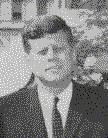Kennedy And The New Frontier
Against this background of world tension, the American people, in November 1960, elected Senator John F. Kennedy to the Presidency. Kennedy defeated by a narrow margin his Republican opponent, Vice President Richard Nixon. The two youthful presidential candidates highlighted their campaigns by appearing on television in a series of debates - Nixon emphasizing the experience he had gained during his eight years in the Eisenhower administration and reminding voters of the "peace and prosperity" achieved under Republican leadership, and Kennedy calling for new, forward-looking leadership and more effective use of the country's human and economic resources.
 In his
Inaugural Address, Kennedy, the youngest President
ever elected in the United States, set the tone of youthful energy
and dedication that was to mark his administration. "The torch
has been passed," he said, "to a new generation of Americans."
Indeed, his Cabinet and his White House advisers made up the
youngest group of top-level officials in the country's history - a
group notable for its openness to new ideas and its readiness to
take vigorous action.
In his
Inaugural Address, Kennedy, the youngest President
ever elected in the United States, set the tone of youthful energy
and dedication that was to mark his administration. "The torch
has been passed," he said, "to a new generation of Americans."
Indeed, his Cabinet and his White House advisers made up the
youngest group of top-level officials in the country's history - a
group notable for its openness to new ideas and its readiness to
take vigorous action.
When President Kennedy took office, the country was generally prosperous, with the average industrial worker's wage at the all-time high of $95 a week. But unemployment was also high, especially in the coal-mining regions of Pennsylvania and West Virginia, which had been seriously affected by the competition of new products and by changes in American living patterns.
The new administration sought legislative remedies for these conditions. An Area Development Act gave the federal government power to help depressed communities start new industries and build needed public facilities. Another law provided retraining, with pay, for workers either unemployed or in low-paying jobs through lack of needed skills. In addition, states were given emergency authority to extend unemployment-insurance payments for 13 weeks beyond the standard 26-week period.
Following the examples of his two predecessors, President Kennedy requested Congress to liberalize some of the existing social legislation. As a result, the Social Security Act provided workers the option to retire at age 62 instead of 65; the minimum wage was increased to $1.25 an hour; and the federal housing program was stepped up to help elderly persons and families with low or moderate incomes find homes at a reasonable cost.
